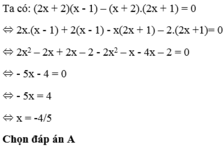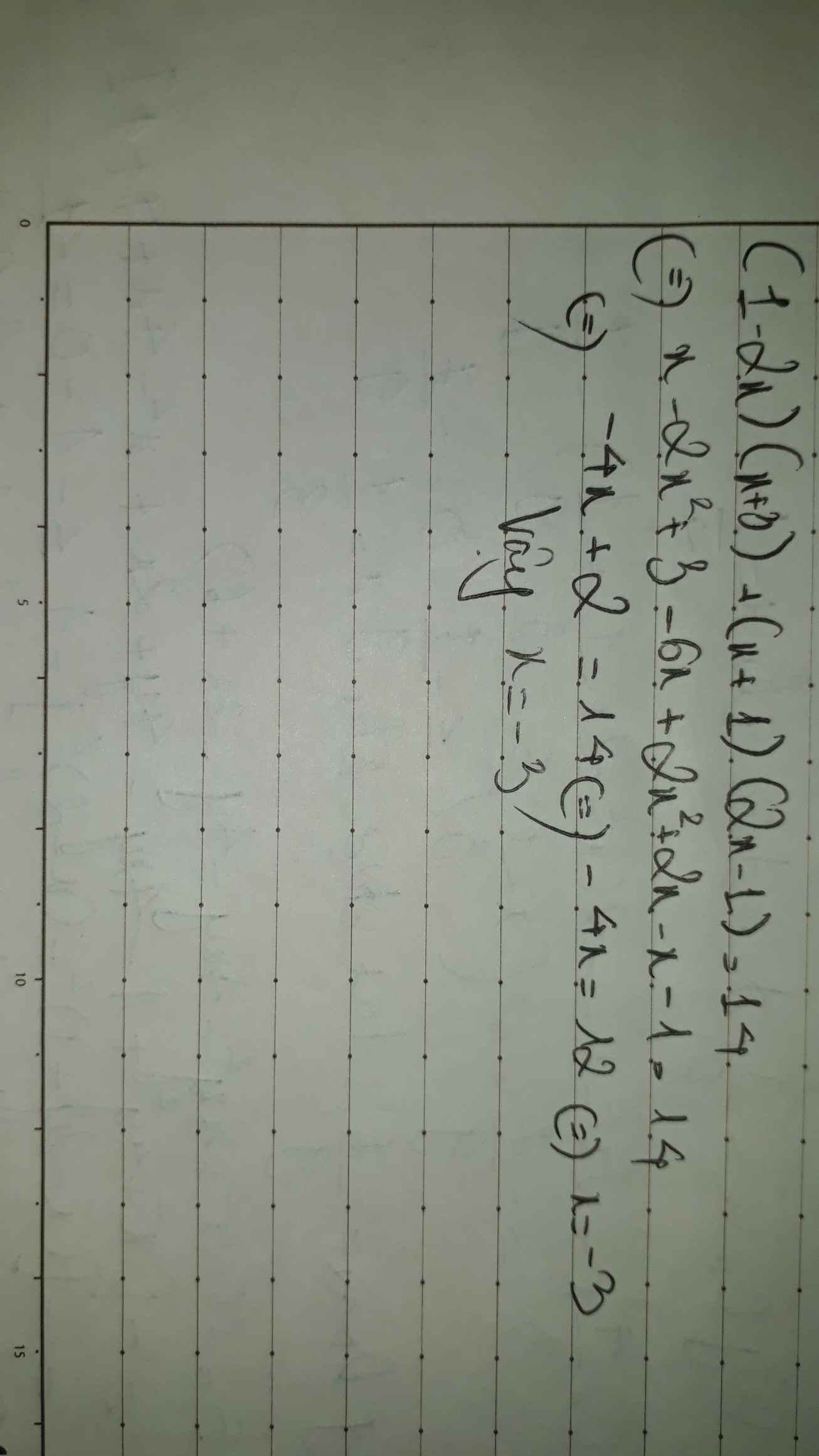Tìm x, biết: ( 2x + 1)2 = 2x +1
Hãy nhập câu hỏi của bạn vào đây, nếu là tài khoản VIP, bạn sẽ được ưu tiên trả lời.


\(\Leftrightarrow\left(2x+1\right)\left(x+1\right)-\left(2x+3\right)\left(x-1\right)=0\)
\(\Leftrightarrow2x^2+3x+1-2x^2-x+3=0\)
=>2x=-4
hay x=-2

a,(2x+1)(y-3)=12
⇒⇒2x+1 và y-3 ∈∈Ư(12)={±1;±2;±3;±4;±6;±12}{±1;±2;±3;±4;±6;±12}
| 2x+1 | 1 | -1 | 2 | -2 | 3 | -3 |
| y-3 | 12 | -12 | 6 | -6 | 4 | -4 |
| x | 0 | -1 | 1212 | −32−32 | 1 | -2 |
| y | 15 | -9 | 9 | 3 | 7 | -1 |
=>x=0,y=15
c) Ta có: \(36^{25}=\left(6^2\right)^{25}=6^{50}\)
\(25^{36}=\left(5^2\right)^{36}=5^{72}\)
Ta có: \(6^{50}=\left(6^5\right)^{10}=7776^{10}\)
mà \(5^{70}=\left(5^7\right)^{10}=78125^{10}\)
nên \(6^{50}< 5^{70}\)
mà \(5^{70}< 5^{72}\)
nên \(6^{50}< 5^{72}\)
hay \(36^{25}< 25^{36}\)

a/
Với $x,y$ là số tự nhiên $2x+1, y-3$ là số nguyên. Mà $(2x+1)(y-3)=12$ nên $2x+1$ là ước của 12.
$2x+1>0, 2x+1$ lẻ nên $2x+1\in \left\{1;3\right\}$
Nếu $2x+1=1\Rightarrow y-3=12$
$\Rightarrow x=0; y=15$
Nếu $2x+1=3\Rightarrow y-3=4$
$\Rightarrow x=1; y=7$
Vậy...........
b/
$2^x+2^{x+1}+2^{x+2}+...+2^{x+2015}=2^{2019}-8$
$2^x(1+2+2^2+2^3+...+2^{2015})=2^{2019}-8(1)$
$2^x(2+2^2+2^3+2^4+...+2^{2016})=2^{2020}-16(2)$ (nhân 2 vế với 2)
Lấy (2) trừ (1) theo vế thì:
$2^x(2^{2016}-1)=2^{2020}-2^{2019}-8$
$2^x(2^{2016}-1)=2^{2019}(2-1)-8=2^{2019}-8$
$2^x(2^{2016}-1)=2^3(2^{2016}-1)$
$\Rightarrow 2^x=2^3$
$\Rightarrow x=3$

\(a,\Leftrightarrow x^3-8-x\left(x^2-9\right)=1\\ \Leftrightarrow x^3-8-x^3+9x=1\\ \Leftrightarrow9x=9\Leftrightarrow x=1\\ b,\Leftrightarrow8x^3+12x^2+6x+1-8x^3 +12x^2-6x+1-24x^2+24x-1=0\Leftrightarrow1=0\Leftrightarrow x\in\varnothing\)
a) \(\Leftrightarrow x^3-8-x^3+9x=1\)
\(\Leftrightarrow9x=9\Leftrightarrow x=1\)
b) \(\Leftrightarrow8x^3+12x^2+6x+1-8x^3+12x^2-6x+1-24x^2+24x-6=5\)
\(\Leftrightarrow24x=9\Leftrightarrow x=\dfrac{3}{8}\)

\(a,\Leftrightarrow\left(x+2\right)\left(x+2-x+3\right)=0\\ \Leftrightarrow5\left(x+2\right)=0\Leftrightarrow x=-2\\ b,\Leftrightarrow2x\left(x-1\right)^2=0\Leftrightarrow\left[{}\begin{matrix}x=0\\x=1\end{matrix}\right.\\ c,\Leftrightarrow\left(x-1-2x-1\right)\left(x-1+2x+1\right)=0\\ \Leftrightarrow3x\left(-x-2\right)=0\Leftrightarrow-3x\left(x+2\right)=0\\ \Leftrightarrow\left[{}\begin{matrix}x=0\\x=-2\end{matrix}\right.\)

Ta có: \(\left(-2x+1\right)\left(x+3\right)+\left(x+1\right)\left(2x-1\right)=14\)
\(\Leftrightarrow-2x^2-6x+x+3+2x^2-x+2x-1=14\)
\(\Leftrightarrow-4x=12\)
hay x=-3


( 2x + 1)2 = 2x +1
=> ( 2x + 1)2 - 2x +1=0
=>4x2+2x=0
=>2x(2x+1)=0
=>2x=0 hoặc 2x+1=0
=>x=0 hoặc -1/2
Vậy...